New Horizon: Changing lives through fashion
How UNFPA and Prada are helping shape the futures of vulnerable young women in Ghana and Kenya
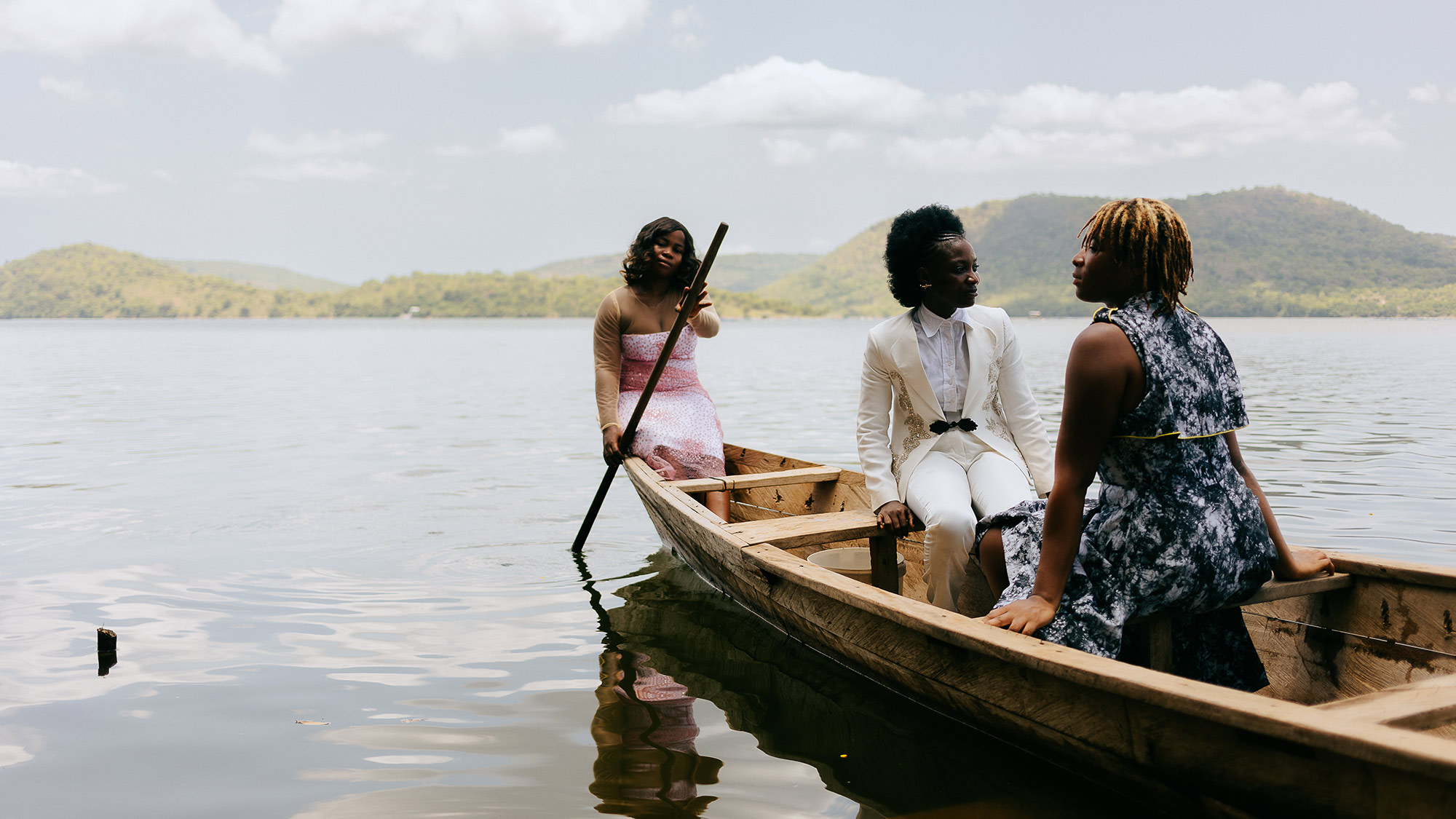
In Ghana and Kenya, the futures of young girls living in poverty are changed by an unexpected fairy godmother: fashion. The Fashion Expressions: the Stories she Wears program was created by UNFPA and Prada Group. It allows vulnerable young women with few prospects and a high likelihood of past and future victimization to get trained, learn a skill and through it the ability both to sustain themselves and to express their full potential. We went to Ghana to meet three of these girls and figure out on the ground how fashion actually does change lives.
In the sweltering heat of an overcast day in Accra, walking up the steps to the atelier of the famous Ghanaian brand Poqua Poqu, we are met with young trainee Pamela Afatsawo, who welcomes us with her shy smile and open demeanour. She is wearing a beautiful flowy dress that she made herself, elegant kitten heels and a long, soft bob. As she models her designs for her first-ever international fashion shoot, she explains: “This has been life-changing for me. Look at me, at my background. There was no hope, no ambition. I lost my mother just as I finished school, in 2018. After that, there was no one to support me, even though I’d always been passionate about fashion. That’s why finding the Fashion Expressions project was such a life-changing experience.” As Chief of the Strategic Partnership Branch UNFPA Mariarosa Cutilo explains: “We wanted to design a program that would bring together UNFPA’s mandate – reproductive health among vulnerable populations – and Prada Group’s leadership in fashion. To empower vulnerable women and girls through fashion.” The Poqua Poqu workshop is in a wide room, filled with sewing and cutting stations, and colourful, intricate clothing hanging along the walls. It is a celebrated, women-led fashion house. Tragically, founder and head designer Pokua Poku-Mouhtiseb had recently died in childbirth, leaving Pamela to mourn another maternal figure in her life. Like many countries in the region, Ghana suffers from the effects of brain drain, and the emigration of qualified medical personnel like midwives to Europe or America, which means that even successful, independent women like Pokua can fall victim to a depleted medical system. She was very loved by all her team, and there is a sadness under the excitement of the day. As her husband Rida explains, “Pokua was a beautiful soul. She always believed in herself as a woman, she wanted to lift up young women to make sure that they have a skill to put food on the table for their families.”
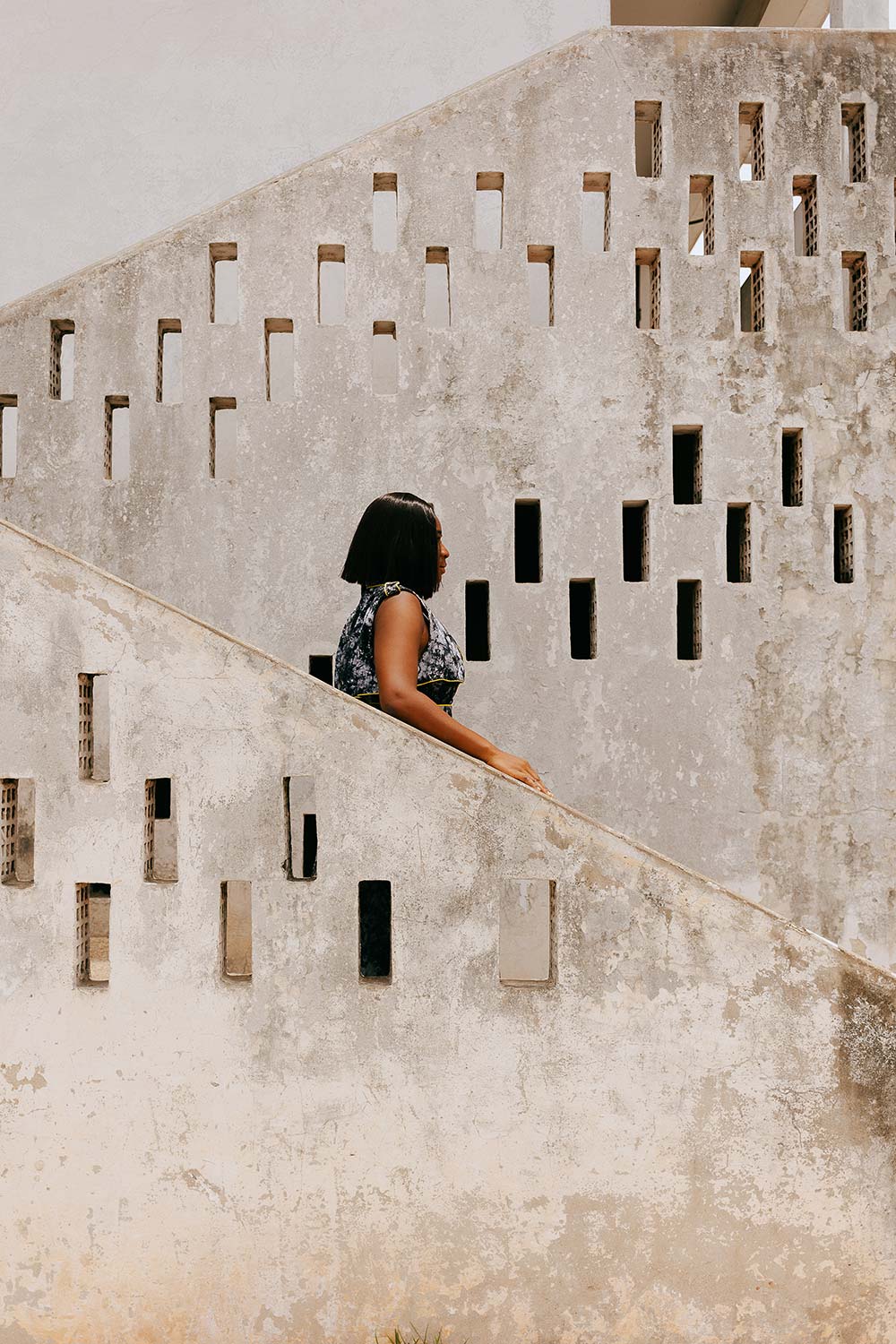
Pamela walks down the stairs from the Poqua Poqu studio. She misses her late boss, and hopes to keep her creative legacy alive.
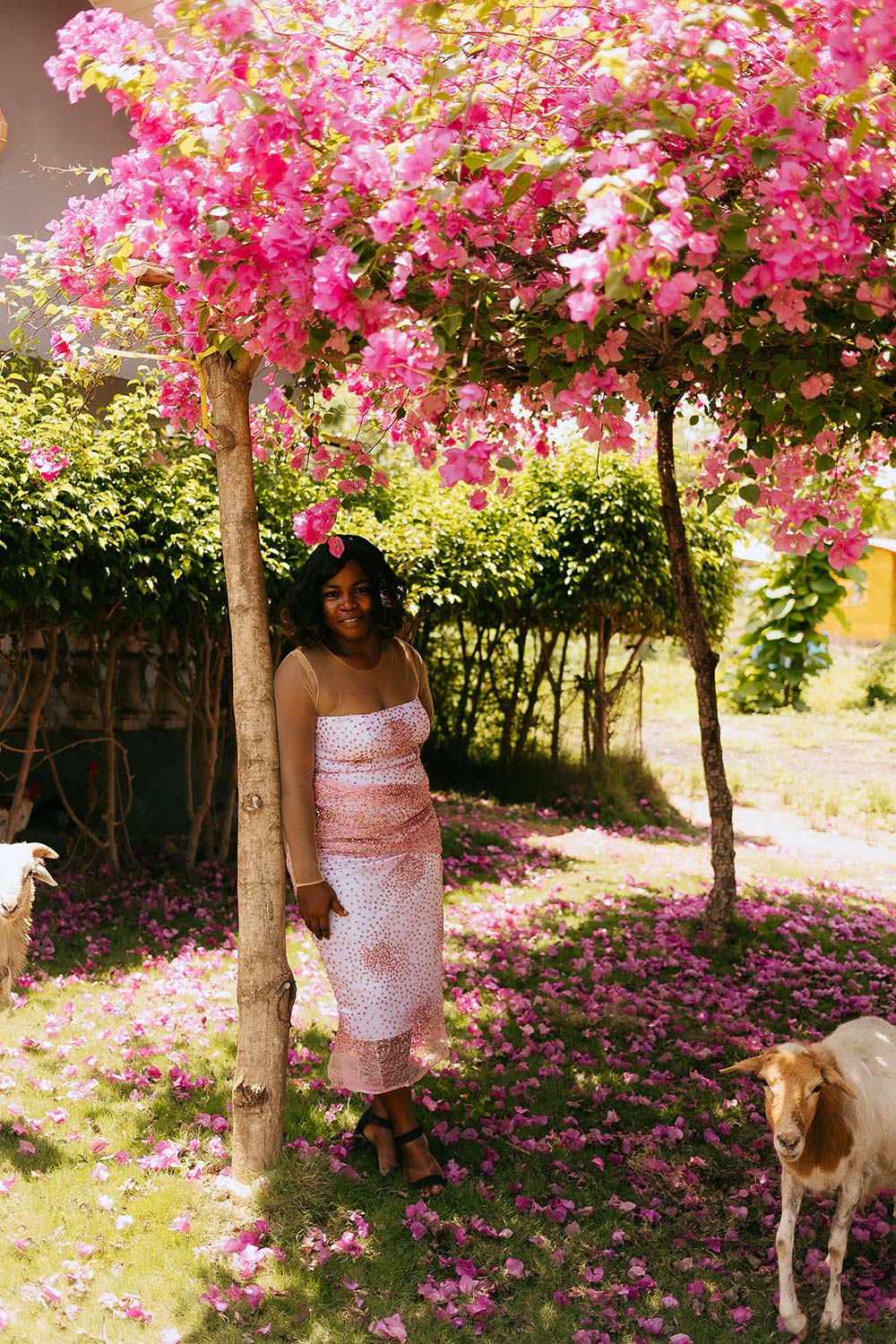
Francisca’s training was in bridal and eveningwear, and she hopes to one day get recognised for this specialised skill.
This is the rationale behind the Fashion Expressions program. Emmily Naphambo, Deputy Representative of the UNFPA Ghana Country Office adds context: “Our mandate is no one left behind. But these girls are the ones you don’t think about. They’re so vulnerable. Sometimes, they’ve lost their parents, sometimes they’ve become teenage mothers, and usually, they are victims of various kinds of abuse. Most of them migrate from the rural parts of Ghana and come to Accra, the big city, to find opportunities and work. And they find themselves in very difficult spaces, on the street, in the markets, trying to earn a living.” She shows on a map: “The north region of Ghana, close to the border with Burkina Faso, is the poorest part of the country. It’s also where the effects of climate change are most felt: no more water, farming becomes difficult, or on the contrary there’s summer flooding. The north is also where you have a lot of polygamy. If a girl is the fourth wife, the man doesn’t necessarily have the resources to feed her children. So it’s up to her to find alternative ways of providing for her kids.” She tells us about the buses filled with these girls, driving along the long road from North to South, looking for opportunities. Their openness and the fact that they travel alone mark them as prime targets for traffickers. And even when they do reach the city, if they don’t know someone or don’t have a place to land, their situation can quickly turn dark and seemingly hopeless. Emmily Naphambo confirms: “For the women who don’t have agency, who are not empowered, the likelihood of them being subjected to gender-based violence is extremely high.”
‘Oh my goodness, if Prada believes in these girls, why not us Ghanaians?’
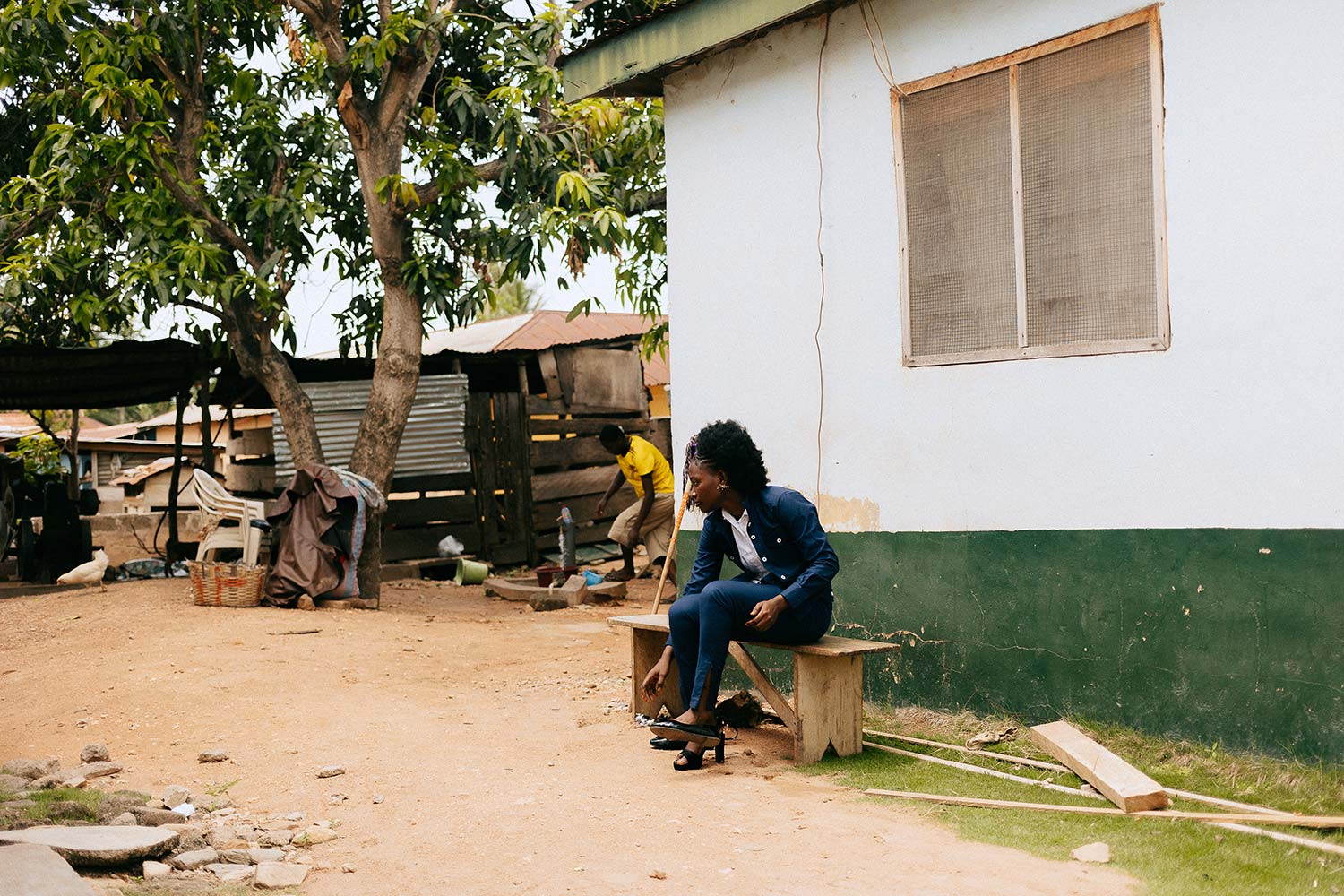
In Kpeve, Melody does a quick outfit change, while the village life continues.
This is where International Needs Ghana (INGH) comes in, as an implementing partner providing support to the partnership between Prada Group and UNFPA. Executive Director Cromwell Awadey explains how their original purpose, which was to “to end child marriage by giving young women and adolescent women a choice,” turned to education as a means to emancipation. “Poverty creates issues of exploitation for the girls. They drop out of school, sometimes just because of period poverty. For many families, if a girl is married or leaves somehow, it’s one less mouth to feed. But the boy, you will push to go to school, thinking that it will be more productive. Which is not proven to be true, actually.” INGH opened a training facility in the Volta region so that young women who have experienced this abandonment can finish their schooling and learn a trade. The Fashion Expressions program starts there: six months spent learning all the steps of the fashion trade – sewing, cutting, sketching, designing… At the end of the program, the students held a graduation fashion show, where they showcased their brand-new skills and their craziest, most beautiful ideas. Cromwell Awadey reminisces: “You know, we all believed in their excellence. But the girls surprised every one of us. They made us proud. There are so many talents wasted because of a lack of opportunities. They just need someone to help them. There is a real need for empowerment.” Emmily Naphambo expands: “When they graduate from the program, the girls are so different from the girls you meet when you start this project.” When asked whether Prada Group’s involvement was a draw for these impoverished yet fashion-conscious girls, she answered that Ghana’s fashion culture is very local, people there have their own sense of style and designers like Poqua Poqu are celebrities in their own right. However, when it came to the post-graduate part of the program, finding internships for these girls in established fashion houses, that’s when the name Prada opened doors. Emmily Naphambo enthuses, a huge smile on her face: “The houses who are able to offer the internships, they know Prada. So when we approached them, their reaction was: ‘Oh my goodness, if Prada believes in these girls, why not us Ghanaians?’ It opened their eyes. When I met Pokua, she told me that she was impressed that Prada Group came here to build the capacity of the girls. And if Prada is doing it, why shouldn’t she do it? The project ignited a desire in Ghanaian fashion brands to do more for the girl child here, in their own country.”
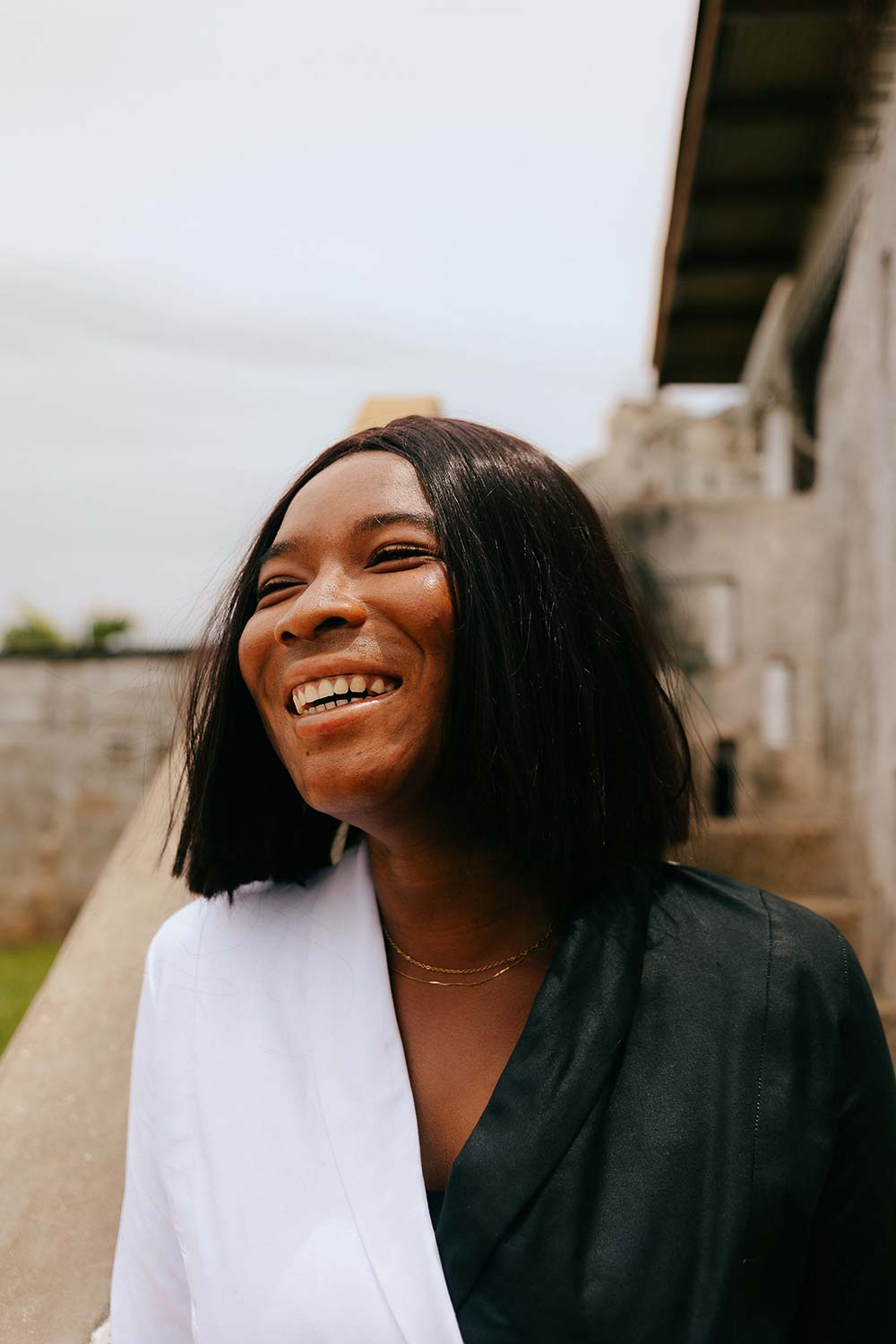
Happy and hopeful, Pamela’s life wasn’t always easy as a teenage mother. But her dream to one day own her own fashion house now seems within reach.
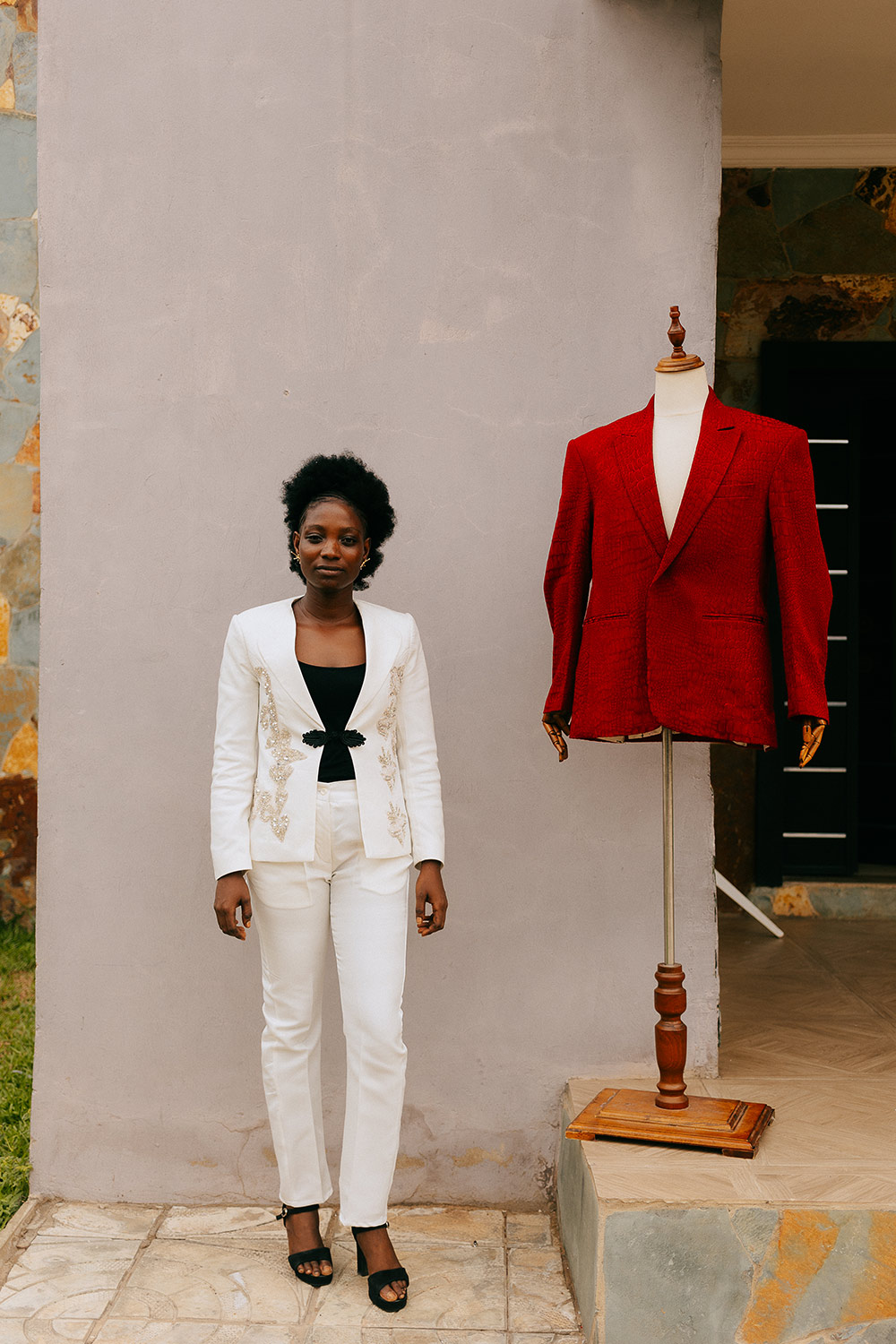
Melody poses next to one of her menswear creations, wearing a suit she made especially for this shoot. She hopes to change attitudes around what is acceptable for women to wear, do and be.
We feel the same enthusiasm at GG Bespoke, a menswear brand that fostered trainee Melody Dekator, a girlish 29-year-old with a winning gap-toothed smile. A rarity in the Ghanaian fashion landscape, which is very traditionally gendered, she makes menswear-inspired clothing for herself. “When I wear this, I’m telling the world that it’s not just men who can wear what I’m wearing. As a lady, I can also dress like this and show the world that fashion evolves. You know, I found out about Fashion Expressions very late. Someone told me that they were looking for girls to train in fashion. I was always interested in clothes, but they had been doing that for a long time before they found me. So when I got there, they were done with the last person, but I just rushed in, and that’s how I joined the program. I was the very last person in!” This is her energy, a positivity, a confidence and an ability to never give up. Her mentor, Gifty Ghartey, the designer of GG Bespoke, confirms: “She’s unstoppable. She always has energy, whether it’s the morning or the evening, whether she has eaten or not, whether she’s tired or not, her energy is always high. The boys in the team call her a soldier. But she also gives us so much joy, she’s a great team member.” Melody had it hard. She became a mother at 17, like so many girls in Ghana. The national rate for teenage pregnancy is 15%, and in the North, it goes up to 25%. These are girls who then have to leave their villages, leave their babies with their mothers to come to the city to get work and send money back home. When they come to Accra, one of the places where they end up is Makola, the expansive, bustling market where people do most of their shopping, as malls and supermarkets aren’t really that popular. Walking among the stalls, being pushed around by shoppers and vendors who have things to do and places to be, you’ll see young girls with basins on their heads, who offer their services as porters. If you hire them, they follow you around as you place your shopping on their head. It’s a physically demanding job, with low prospects and high vulnerability to injury and sexual assault. This is one of the places where International Needs Ghana goes to recruit girls for their training programs. Some of them find community among the porters and don’t want to leave. But many do jump on the opportunity. Cromwell Awadey recalls: “We were looking for motivation, those who were willing, had the time, and wanted to be in the fashion industry. Once they applied, we tested whether they would have the ability to finish the course, because we needed to limit drop-off. But having a knowledge and understanding of fashion was not required, because that’s what we were going to teach them. Are you willing? Are you ready? That was our approach.” This is how they ended up with a 100% completion rate for the course in Ghana
‘This program changed my entire life. It changed me emotionally and physically.’
Francisca Emefa Gbedoxo - Student from The Fashion Expressions: the Stories she Wears program
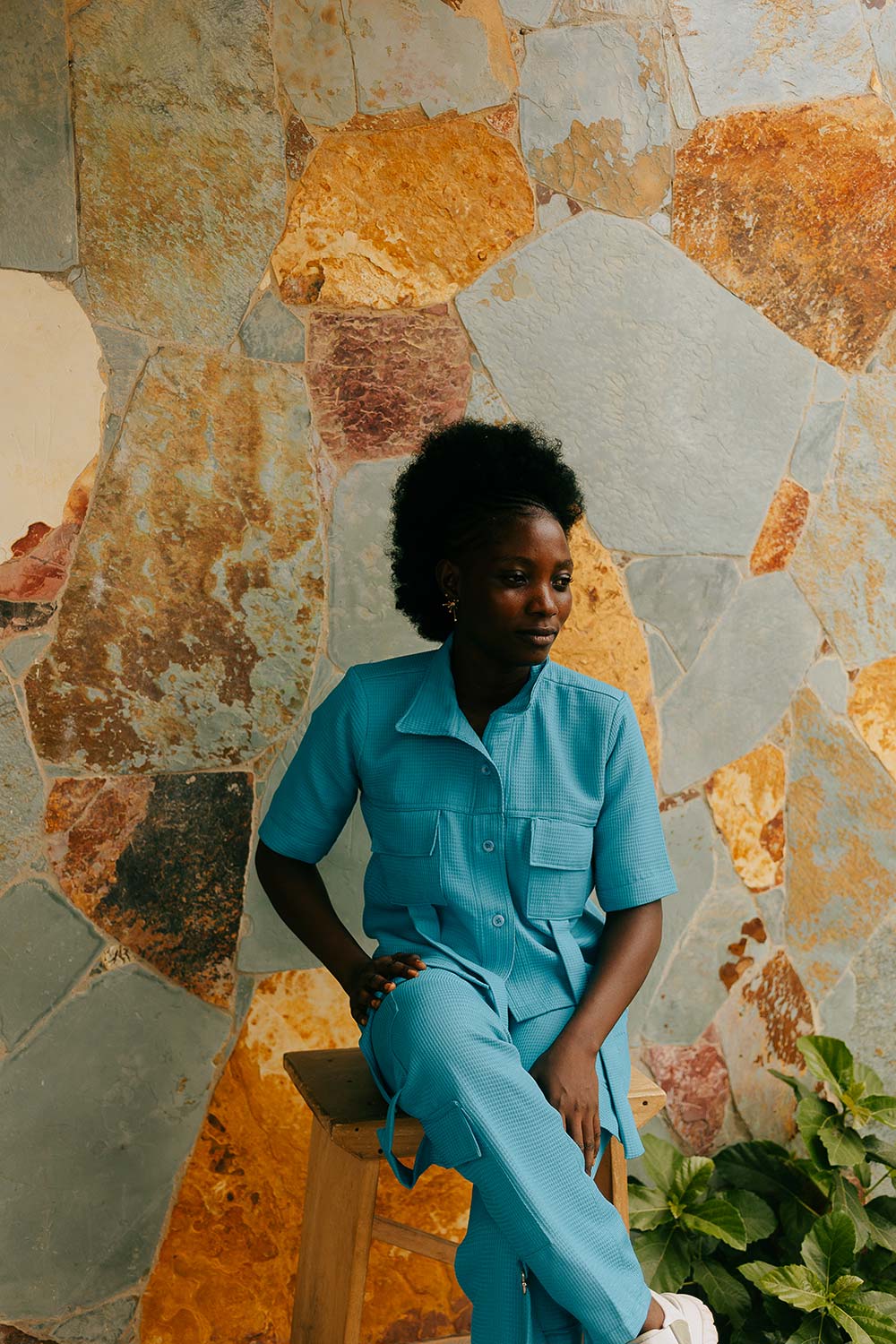
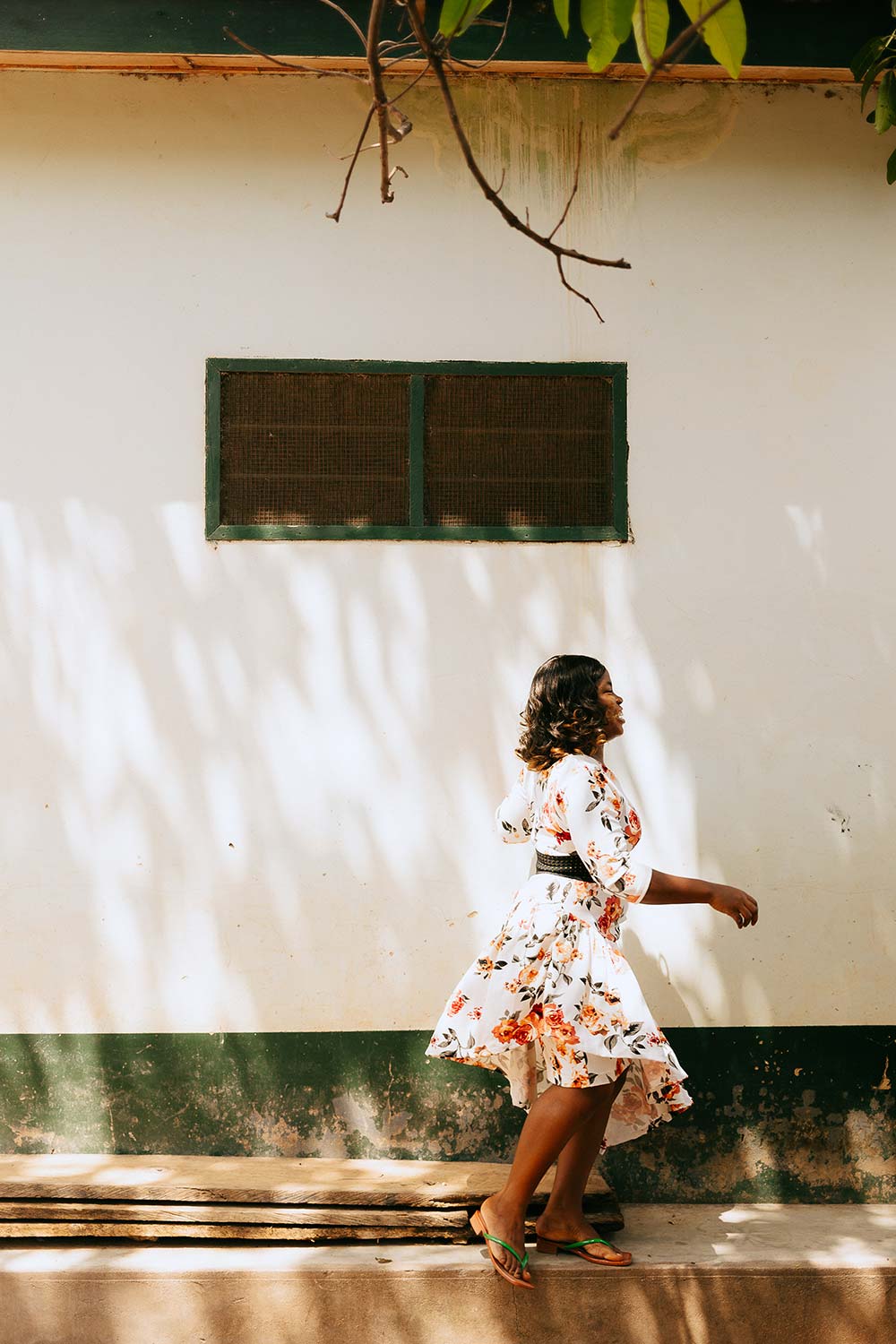
Francisca twirls in front of her mother’s house, in Kpeve village. Even for the simple styles she makes for the local clientele, her creativity and skills show.
The next day, we decide to take Pamela and Melody to Kpeve, a village in the Volta Region of Ghana, where their former classmate Francisca Emefa Gbedoxo grew up, and moved back to after her internship, to open her own small shop, next to her mother’s house. A class reunion of sorts, as the three girls hadn’t seen each other since graduation. After the three-hour drive into the Volta region, they jump out of the car and fall into each other’s arms, chanting “Fashion Expressions!” as they jump around. Francisca is shy, but you can feel her resolve. Her little shop is painted blue inside and out, a testament to her strong aesthetic sense and true belief in her vision. “This program changed my entire life. It changed me emotionally and physically. When I look at my picture from when I first started, I look like a different person.” This sentiment is echoed by Francisca’s mother, who looks on proudly, and by Priscilla Tigoe of UNFPA Ghana, who acts as a chaperone of sorts, and tears up when she sees how far they’ve all come. As we move to the nearby river to do a fashion shoot of the three girls together, they laugh, sing, try not to be too awkward when posing, and share their dreams for the future. Pamela exclaims: “I want to be a fashion designer. I want the opportunity to work in the biggest fashion houses in the world. To all my fellow girls who are feeling down because there’s no hope, let me enlighten you. I was also there. Just be ready to do something for yourself, and when an opportunity finally comes, make good use of it and don’t let it go to waste.” They all want to pay it forward. Francisca gushes: “In the next five years, I see myself as a successful fashion designer, selling my clothes on social media all over the world. I also want to open internships for the girls in my village, I want to have a fashion house and train the young ladies who are interested in fashion like me.” She already has her first trainee, a young mother who comes with her tiny daughter to learn from her. The ripple effect of this program is immeasurable, as each young woman is a beacon of hope for other vulnerable young women, the living embodiment of the fact that there can be a way out of seemingly hopeless situations. As we leave, Francisca starts to cry, overcome with the realization that her designs will be on the pages of an international fashion magazine. In the car, as we drive away, back to the city, I ask Melody what she’s thinking. “I’ve always wanted to own a fashion house, to train girls to give the best of themselves, to learn fashion skills so that they can be independent. I believe educating a man is educating an individual, but if you educate a woman you educate the whole nation.”
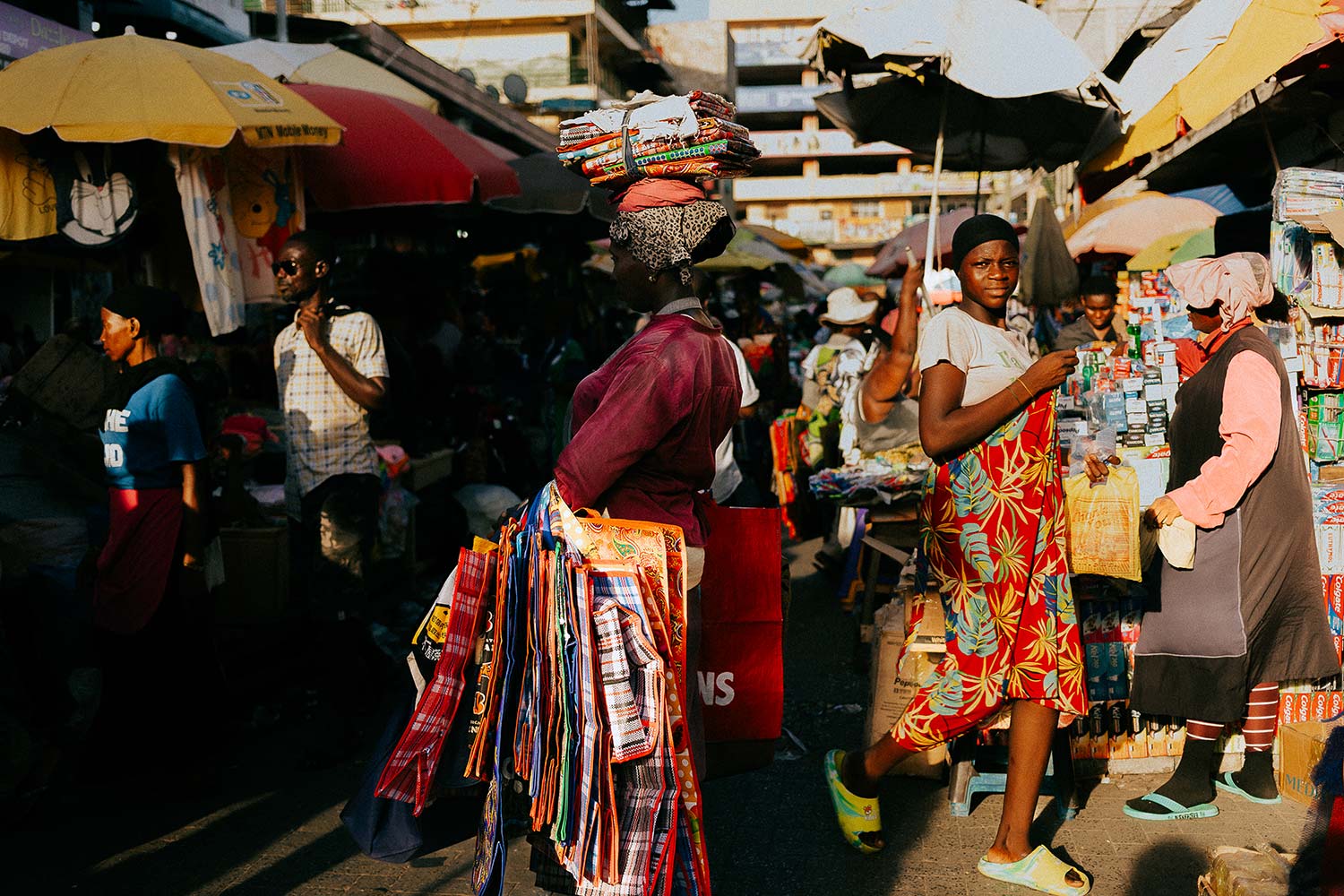
A scene from Makola market, where unskilled women can find work as porters. An exhausting, dangerous job, especially for vulnerable young girls.
3 questions to Lorenzo Bertelli, Prada Group Head of CSR
How can fashion change lives?
Marie Claire Newsletter
Celebrity news, beauty, fashion advice, and fascinating features, delivered straight to your inbox!
Fashion continues to be a powerful tool of empowerment for these women who come from underserved communities and have challenging life experiences. This program has allowed fashion to become a means of economic independence, allowing young women to take care of themselves, their futures and their families. I am very proud of this result.
Do you feel luxury groups have a social responsibility?
I believe we are doing what is right, and we are doing our part as an organisation. The more companies join forces to create programs that address social issues, the more impact we can have.
What is next for the Fashion Expressions program?
Due to the success of the first edition, the project expanded to Mexico in September 2023, involving 30 women artisans in Querétaro state. My wish is to instil hope for a brighter future in these women, giving them the necessary tools to advance both on a personal and professional level.
Words: Galia Loupan
Photos: Rachel Seidu
-
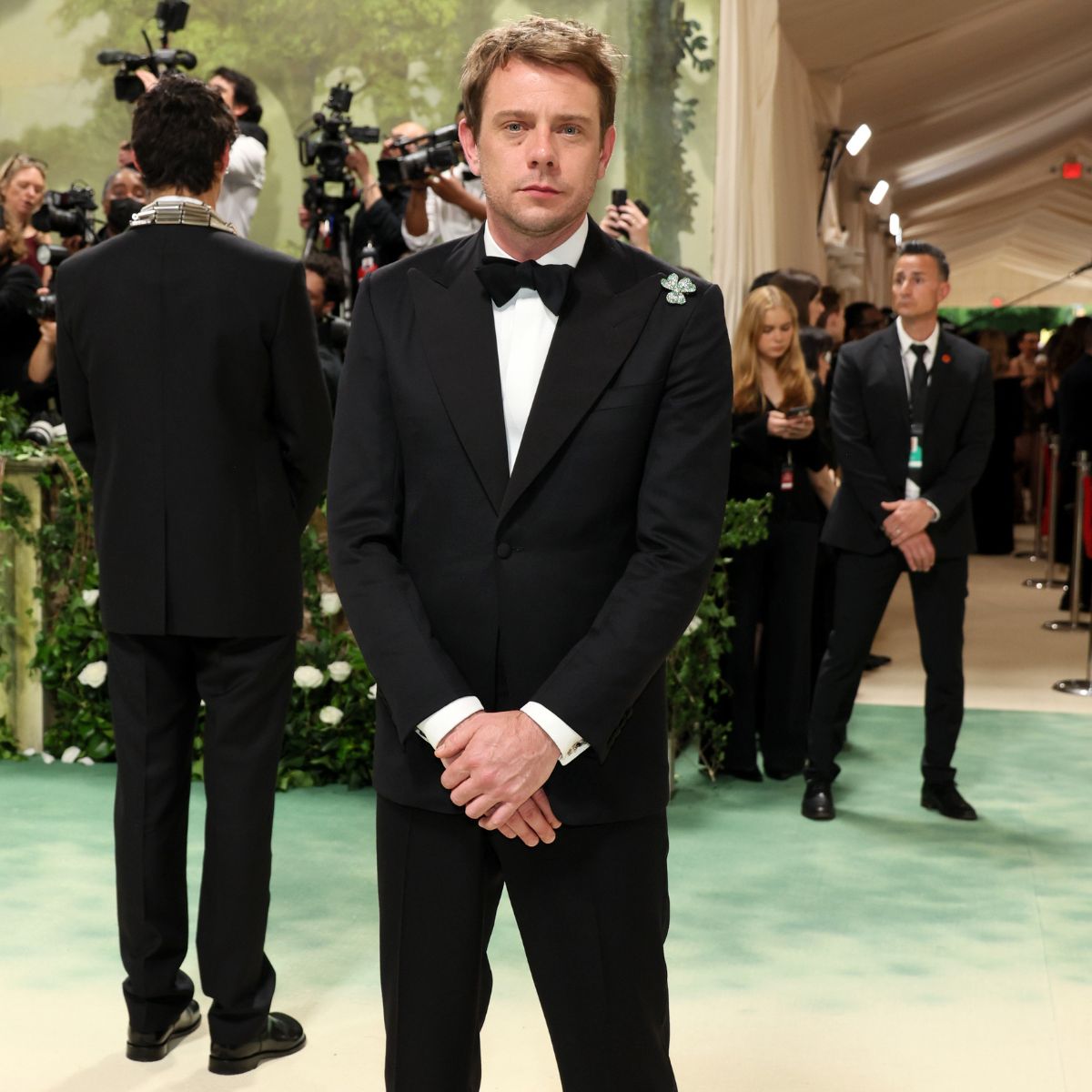 Jonathan Anderson is going to Dior Men
Jonathan Anderson is going to Dior MenHis debut collection will be this June
By Mischa Anouk Smith
-
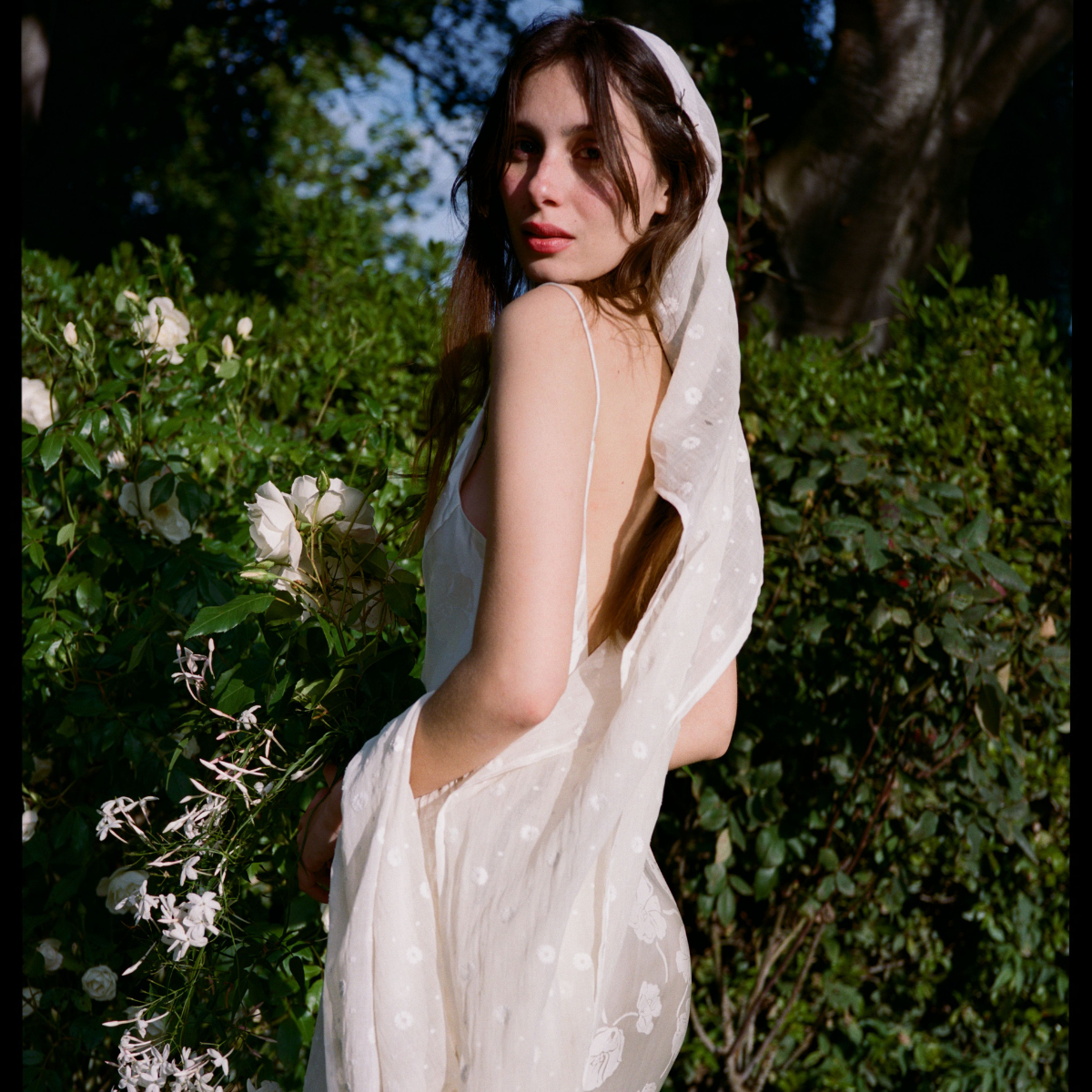 I'm a 2025 bride and these are the best affordable wedding dresses I've found
I'm a 2025 bride and these are the best affordable wedding dresses I've foundLess than £1,000 but still the height of chic
By Sofia Piza
-
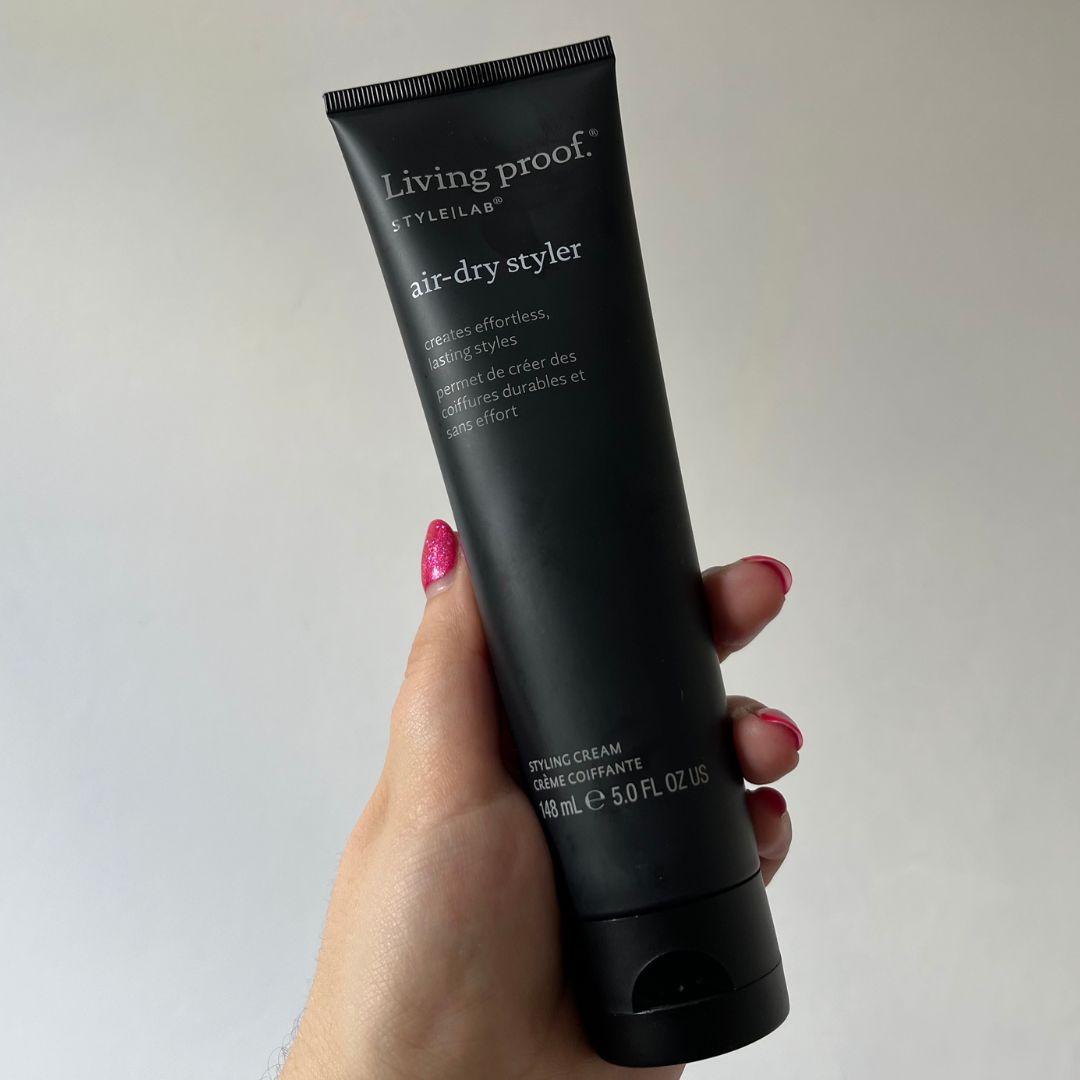 I haven't worn my hair completely natural for years, but this air-dry styling cream has made me love my waves again
I haven't worn my hair completely natural for years, but this air-dry styling cream has made me love my waves againI will never be without this
By Amelia Yeomans